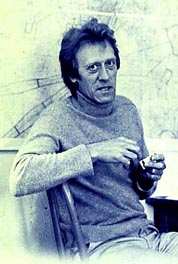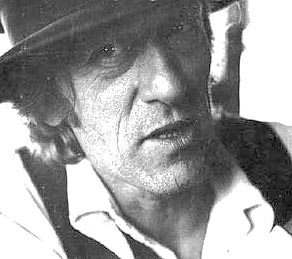
| C O N T E N T S | H O M E P A G E | J A C K E T # N I N E | O C T O B E R 1 9 9 9 |
| |
| |
| |
THE POET EDWARD DORN died after a long struggle with pancreatic cancer at his home in Denver early on the evening of December 10, 1999. Is this thing madeThese lines come from "Wait by the door awhile Death, there are others," a poem written by Dorn in 1965. They foreshadow the engagement and interrogation of Ed's last poems as well. Along with unfinished long poems about two other longtime subjects of his, heresy and geography -- "Languedoc Variorum" and "Westward Haut" -- he left in "progress" a verse journal of his final chemotherapeutic nightmare-enlightenments, «Chemo Sabe», in which the poet's confrontation with techno-medicine serves as a kind of warrior's trial and induction to death. At the end of a section of that latter work, titled "Chemo du Jour: The Impeachment on Decadron," he narrates an infusion of Taxol, a drug produced from yew tree toxins, while watching Clinton's impeachment trial, among other dark comedies, on television in a Denver hospital: And Lo now the Taxol infusion clears the atmosphere  Ed was born and grew up in Eastern Illinois, on the banks of the river Embarrass (a tributary of the Wabash). He never knew his father. His mother was of French-Canadian ancestry, his maternal grandfather a half-Indian Quebecois railroad man ("master pipefitter in the age of steam"). He attended a one-room school, and while in high school played billiards with the local undertaker for a dime a point. "Brought up off and on during / the intensity of depression nomadism," he followed the wandering work-searches of his several "exodus relatives" down "bleak grit avenues" of a childhood whose anxious, difficult instruction, though he was always shy of speaking of it, never ceased to underlie and complicate the moral and historical vision of his work. Images of vulnerability and displacement in his poems project this. In a late poem called "Tribe" Dorn declares an explicit identification with the plight of refugee Kurds, relating their exposure before the imperial contingency of "wholesale helicopter gunships" to his own autobiographical family recollections: "My tribe was lowdown struggling day labor / Depression South Eastern / Illinois just before the southern hills start / to roll toward the coal country / where the east/west morainal ridges / of Wisconsin trash pile up / at the bottom of the prairie, socially / a far midwest recrudescence of Appalachia . . . I'm as proud of my tribe as if I were a Kurd."
Ed was born and grew up in Eastern Illinois, on the banks of the river Embarrass (a tributary of the Wabash). He never knew his father. His mother was of French-Canadian ancestry, his maternal grandfather a half-Indian Quebecois railroad man ("master pipefitter in the age of steam"). He attended a one-room school, and while in high school played billiards with the local undertaker for a dime a point. "Brought up off and on during / the intensity of depression nomadism," he followed the wandering work-searches of his several "exodus relatives" down "bleak grit avenues" of a childhood whose anxious, difficult instruction, though he was always shy of speaking of it, never ceased to underlie and complicate the moral and historical vision of his work. Images of vulnerability and displacement in his poems project this. In a late poem called "Tribe" Dorn declares an explicit identification with the plight of refugee Kurds, relating their exposure before the imperial contingency of "wholesale helicopter gunships" to his own autobiographical family recollections: "My tribe was lowdown struggling day labor / Depression South Eastern / Illinois just before the southern hills start / to roll toward the coal country / where the east/west morainal ridges / of Wisconsin trash pile up / at the bottom of the prairie, socially / a far midwest recrudescence of Appalachia . . . I'm as proud of my tribe as if I were a Kurd." | |
| |
Maybe it's in part because he had a lonely and precarious beginning in life that later on Dorn always liked to surround himself with congenial company. In life as in literature Ed had this weird little travelling party or company: the cowboy, the dance hall madam, the poet-singer, the Stoned Horse, among others. The great honor of friendship he conferred on me was to number me as an outrider of that party of outriders, along with other diverse disparate friends. As to Ed's itinerant young manhood out West -- of which one can get some sense in an image from a Hands Up! poem, "a windborn seed" -- I learned quite a bit from travelling with him across the upper Plains in 1979 on what was supposed to be a reporting assignment. We were "covering" the Wyoming energy boom for a magazine, but Ed's coverage always went deeper, wider, longer. We crested the Wind River range in white light and came down to Moorcroft, Wyoming, where Ed drove me past the old New Moorcroft Hotel, a landmark in his great early story «C. B. & Q.». We found Tiny's restaurant, back of which the half desert still begins, just as it does in that story. In Ed's day crews of gandy dancers hung out there between shifts. Ed was remembering his wandering working-life circa 1951, when "You could work endless hours but it was dangerous."  On that same trip we followed the Belle Fourche up toward the Badlands and Ed had me walk around Devil's Tower with him. It's a long way around Devil's Tower. When we got to the west face, looking out over two hundred miles of prairie, I saw nothing, out at the horizon rim the sky trembled and shone, in between the space looked completely empty. Ed then filled it for me with the substantial history of everything that had ever happened out there. He was always giving me everything -- the most generous man I've ever known.
On that same trip we followed the Belle Fourche up toward the Badlands and Ed had me walk around Devil's Tower with him. It's a long way around Devil's Tower. When we got to the west face, looking out over two hundred miles of prairie, I saw nothing, out at the horizon rim the sky trembled and shone, in between the space looked completely empty. Ed then filled it for me with the substantial history of everything that had ever happened out there. He was always giving me everything -- the most generous man I've ever known.If it should ever come
Tom Clark | |
| |
You can read three poems by Tom Clark Photo credits: top photo: scanned from the back cover of «Edward Dorn: Selected Poems» photo copyright © Lynne Domash; bottom photo: scanned from the back cover of «Slinger» 1975, photo copyright © by R. Rusk; with thanks, and with thanks to Dale Smith for providing the scans. | |
|
|
|